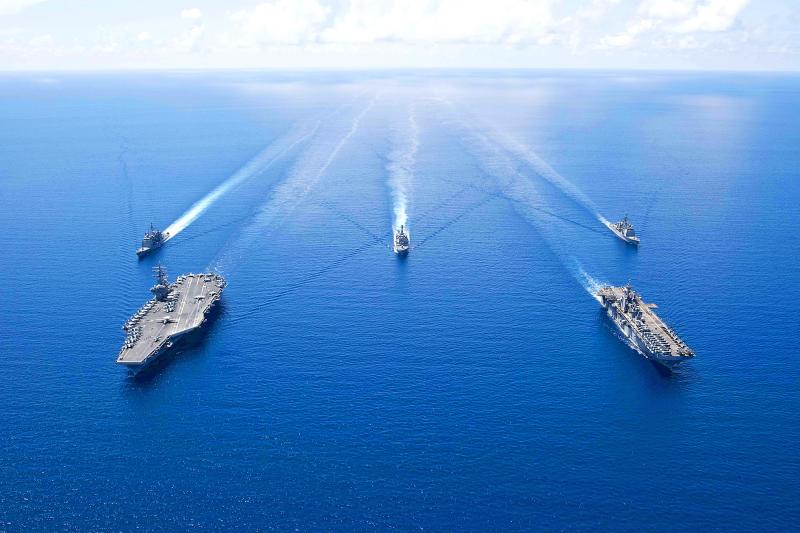Democratic Progressive Party (DPP) legislators yesterday lauded the US’ National Defense Authorization Act for the next fiscal year, which includes an initiative analysts believe would bolster Taiwan’s defenses against China.
The US Senate Committee on Armed Services on June 11 voted 25-2 in favor of approving the act, which would include the Pacific Deterrence Initiative — a US$6.9 billion program that would expand on the US’ 2018 Asia Reassurance Initiative Act and bolster the US’ naval presence in the region.
DPP legislators Wang Ting-yu (王定宇) and Tsai Shih-ying (蔡適應) yesterday welcomed the initiative, saying that it fulfills the US’ promise to defend regional security.

Photo: EPA-EFE
A report published to the Web site of Voice of America on Thursday last week cited analysts who said that the act was likely aimed at countering recent military aggression by China including its sending of a survey ship into Vietnamese waters earlier this year and its trespassing into Taiwan’s air defense zone five times so far this month.
If ratified by US President Donald Trump, the act would see US$1.4 billion budgeted for the initiative next year, and US$5.5 billion spent on it in 2022.
Wang said he believed that the act meant that Taiwan-US military cooperation would increase, and that Taiwan would become more important from a strategic point of view.
Tsai said the US’ increased military investment in the Asia-Pacific meant that it recognized the changing situation in the region, and it believed that maintaining peace and stability in the region was in everyone’s interest.
National Taiwan University associate professor Chen Shih-min (陳世民) said that the upcoming US presidential election is likely playing a part in Washington’s posturing toward China, particularly as the US’ economy has been hit hard by the COVID-19 pandemic.
US senators probably believe they could rally support from smaller Asia-Pacific ally countries that have been threatened by China, but there is no guarantee that Trump would ratify the act, Chen said, adding that it would depend on the state of US-China relations when the act crosses Trump’s desk.
If the act is ratified, it would most certainly result in a backlash from China due to the implications for Taiwan, which China would see as “meddling with its internal affairs,” he said.
“Although Trump likes to play the ‘China card,’ at the end of the day he is a businessman. While he’s seeking re-election he is unlikley to do anything that could impact the US’ agricultural trade with China,” Chen said.

Taiwan is stepping up plans to create self-sufficient supply chains for combat drones and increase foreign orders from the US to counter China’s numerical superiority, a defense official said on Saturday. Commenting on condition of anonymity, the official said the nation’s armed forces are in agreement with US Admiral Samuel Paparo’s assessment that Taiwan’s military must be prepared to turn the nation’s waters into a “hellscape” for the Chinese People’s Liberation Army (PLA). Paparo, the commander of the US Indo-Pacific Command, reiterated the concept during a Congressional hearing in Washington on Wednesday. He first coined the term in a security conference last

DEFENSE: The National Security Bureau promised to expand communication and intelligence cooperation with global partners and enhance its strategic analytical skills China has not only increased military exercises and “gray zone” tactics against Taiwan this year, but also continues to recruit military personnel for espionage, the National Security Bureau (NSB) said yesterday in a report to the Legislative Yuan. The bureau submitted the report ahead of NSB Director-General Tsai Ming-yen’s (蔡明彥) appearance before the Foreign and National Defense Committee today. Last year, the Chinese People’s Liberation Army (PLA) conducted “Joint Sword-2024A and B” military exercises targeting Taiwan and carried out 40 combat readiness patrols, the bureau said. In addition, Chinese military aircraft entered Taiwan’s airspace 3,070 times last year, up about

A magnitude 4.3 earthquake struck eastern Taiwan's Hualien County at 8:31am today, according to the Central Weather Administration (CWA). The epicenter of the temblor was located in Hualien County, about 70.3 kilometers south southwest of Hualien County Hall, at a depth of 23.2km, according to the administration. There were no immediate reports of damage resulting from the quake. The earthquake's intensity, which gauges the actual effect of a temblor, was highest in Taitung County, where it measured 3 on Taiwan's 7-tier intensity scale. The quake also measured an intensity of 2 in Hualien and Nantou counties, the CWA said.

The Overseas Community Affairs Council (OCAC) yesterday announced a fundraising campaign to support survivors of the magnitude 7.7 earthquake that struck Myanmar on March 28, with two prayer events scheduled in Taipei and Taichung later this week. “While initial rescue operations have concluded [in Myanmar], many survivors are now facing increasingly difficult living conditions,” OCAC Minister Hsu Chia-ching (徐佳青) told a news conference in Taipei. The fundraising campaign, which runs through May 31, is focused on supporting the reconstruction of damaged overseas compatriot schools, assisting students from Myanmar in Taiwan, and providing essential items, such as drinking water, food and medical supplies,